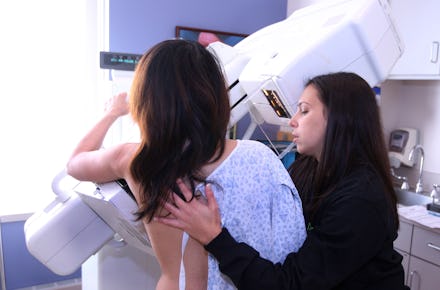Obamacare helped more women get mammograms, according to study

A new study from medical journal Cancer shows that more women got mammograms under the Affordable Care Act, which requires insurance companies to cover 100% of the costs for the preventative screenings.
According to CNN, the study's lead author, Dr. Gregory Cooper, said eliminating financial obstacles to receiving a mammogram proved to be crucial in increasing access for women of all socioeconomic backgrounds.
"We know that more affluent people are more likely to get screened," Cooper told the outlet. "If you take away some of the financial barriers, would the gap between the poorest and wealthiest begin to narrow?"
Cooper and his fellow researchers found that the answer was, resoundingly, yes.
Those who took advantage of the ACA's preventative care coverage have reason to worry once President-elect Donald Trump takes office.
Throughout his campaign, Trump repeatedly pledged to repeal the Affordable Care Act on his first day in office. And it seems the GOP is prepared to make good on that promise: On Thursday, Republicans in Congress announced that they would propose the repeal of the ACA and the defunding of Planned Parenthood all together in one bill.
If this study is any indication, repealing the ACA could mean fewer people would have access to mammograms — which means Americans' lives could be on the line.
Mammograms prevent breast cancer deaths. According to Breastcancer.org, catching breast cancer in its early stages reduces the chances of dying from the disease by at least 25 to 30%, and mammography is patients' best bet of detecting it. Most people with breasts begin getting annual mammograms at 40.
Mammograms involve taking X-rays of the breast from various angles. The technology can often detect breast cancer early — in some cases, before a patient can even feel a lump. This is when breast cancer is most treatable, according to the American Cancer Society.
Around one in eight people with breasts in the U.S. will develop breast cancer at some point in their life, according to Breastcancer.org. In 2016, more than 40,000 Americans were predicted to die from the disease. Deaths from breast cancer have been on the decline since 1989 — and it's "thought to be the result of treatment advances, earlier detection through screening and increased awareness."
Republicans hellbent on repealing ACA seem to have put little thought into how people relying on the legislation will receive these yearly screenings. In fact, they haven't hinted at any alternative at all.
Trump called for both sides of the aisle to "come up with a health plan that really works" — suggesting he has no plans to replace the ACA.
Cooper told CNN he hopes that ACA adversaries consider the benefits of keeping preventative care procedures affordable and accessible.
He said, "I haven't heard anything about preventive services, but I would argue that, even if the program itself is dismantled, that would be a worthy benefit to keep."